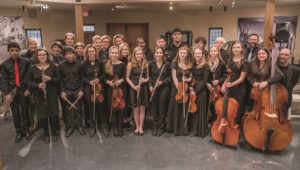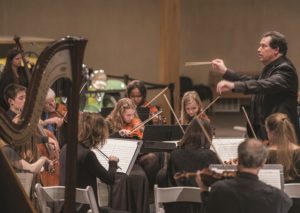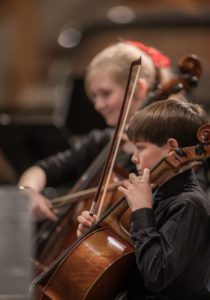A dozen or so students watch, intently, as Paige Wayner, a flutist in the Cape Youth Orchestra, prepares to play Ernest Bloch’s Suite Modale in a master class for Zachary Sheets, principal flutist of the Cape Symphony.
“Before you play, is there anything specific that you want to focus on or improve?” asks Sheets.
“The dynamics,” answers Wayner, “and how to have more resonance and presence.”
“That is kind of hard over Zoom, but we will do our best,” says Sheets.
Since September, the musicians of the Cape Youth Orchestra have been meeting on Saturday mornings, via Zoom. Usually, they spend the session learning about music history and theory. Last week’s master class was a special event, and they are planning more of them in the coming months.

“If we can’t have them playing together, the next best thing is to make them smarter, more informed, and help them develop their musicianship,” says conductor Mark Miller.
Miller, who also conducts the Boston Youth Symphony Repertory Orchestra, took on the Cape position just last year. At the time, the orchestra had “melted away to almost nothing,” but he built it up, and they had a successful concert in January. Then the pandemic hit.
“It was as if you just started the campfire and then there was a downpour,” he says.
In spite of this, the Youth Orchestra currently has 15 members, mostly high school students, from all over the Cape. And they show up, week in and week out.
“I know how hard it is to have kids stare at a screen all week, and then stare at a screen on a Saturday,” says Miller. But there’s something that keeps drawing them back.

The Youth Orchestra musicians, unfortunately, cannot play together over Zoom because of delays — it’s impossible to synchronize the sound coming from the different players. They are planning, however, to work towards a multitrack recording using the Soundtrap system.
Numerous professional orchestras have been doing this, but staying together, and staying in tune, are challenging when multitracking, even for seasoned musicians. “Things that are effortless in the presence of other people suddenly become very difficult,” says Miller.
Full disclosure: I was a member of the Cape Youth Symphony when I was in high school. It is probably one of the reasons why I stuck with music (I am a cellist and musicologist). It was so important to have that outlet, and encouragement, in a place that is fairly musically isolated like Cape Cod.
For young musicians right now, that need is even greater.

“It’s old saws, but there is truth to the things you hear about teamwork, repetition, memory, and academic skills,” says Miller. “It’s pretty much decided science that pursuing music is very good for people.”
Furthermore, being in the orchestra “puts them in touch with people who play as well as or better than they do,” notes Miller. “People who are as weird as they are, the band geeks, who care about this thing that no one around them understands. They are around their own people … I suspect we have saved some lives.”
With musical organizations like the Metropolitan Opera on furlough, and musicians around the world losing their incomes, the future of live music hangs in the balance. “By keeping some energy in this,” says Miller, “we are trying to keep something going in an art form that is now fragile.”
And to kids thinking about pursuing music right now, Miller says, “Don’t give up. It’s not all over. Don’t lose time.”



